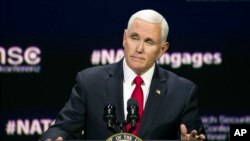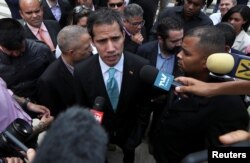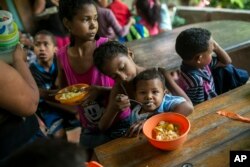U.S. Vice President Mike Pence announced new sanctions Friday on 34 vessels of Venezuela's state oil company and two companies that ship crude oil to Cuba.
Pence made the announcement while in Texas, during a speech at Rice University.
"Venezuela's oil belongs to the Venezuelan people," he said. Venezuela is undergoing a humanitarian crisis, with skyrocketing inflation and shortages of food, water, and power.
The new sanctions are part of the U.S. effort to oust Venezuelan President Nicolas Maduro, making way for opposition leader Juan Gauido, which the United States and 50 other countries support as Venezuela's rightful leader.
Pence's announcement preceded a formal statement from the U.S. Treasury about the sanctions. Treasury Secretary Steven Mnuchin said, "The United States remains committed to a transition to democracy in Venezuela and to holding the Cuban regime accountable for its direct involvement in Venezuela's demise."
Mnuchin said the shipments to Cuba are "providing a lifeline to keep the illegitimate Maduro regime afloat."
Earlier Friday, the United States and Switzerland reached agreement for the central European country to represent U.S. interests in Venezuela, now that the two countries are estranged.
In order for the mandate to be effective, it must first be endorsed by Venezuela — which severed diplomatic ties with the U.S. after the U.S. recognized opposition leader Juan Guaido as Venezuela's legitimate interim president.
The agreement was signed in the Swiss capital of Bern by U.S. Ambassador to Switzerland Ed McMullen and Swiss Foreign Minister Ignazio Cassis.
"The mandate provides Switzerland the opportunity to contribute to de-escalating tensions between the two countries and thus play a constructive role on behalf of regional stability," the Swiss government said in a statement.
Included in the agreement are so-called protecting power mandates that allow Switzerland, a neutral country, to intervene as an intermediary, providing consular services or undertaking diplomatic initiatives.
Switzerland also represents U.S. interests in Iran and has previously done so in Cuba.
In addition to the U.S., some 50 other countries have recognized Guaido instead of President Nicolas Maduro. Earlier this week, the U.S. completed the withdrawal of all diplomatic personnel from Venezuela after a Jan. 24 decision to withdraw dependents and cut embassy staff.
Humanitarian crisis
Venezuela's economy has been battered for years by hyperinflation, creating a humanitarian crisis that has forced millions to flee to other countries.
UNICEF says an estimated 1.1 million Venezuelan children are going to need "protection and access to basic services across Latin America and the Caribbean in 2019."
That number includes children who have been uprooted from Venezuela — as well as returnees and those living in host and transit communities.
That projection, the U.N. children's agency said in a statement Friday, is in addition to the nearly half a million children currently in need of "essential services like protection, healthcare, and education in host and transit countries" that are already feeling the strain of the additional children.
UNICEF said its regional humanitarian partners — Brazil, Colombia, Ecuador, Guyana, Panama, Peru, and Trinidad and Tobago — estimate as many as 4.9 million adults and children will need assistance this year because of the political and economic upheavals in Venezuela that are forcing the country's citizens to flee.
The agency has appealed for $69.5 million to meet the needs of the uprooted Venezuelan children who are living in the region.
Maria Cristina Perceval, the UNICEF regional director for Latin America and the Caribbean, said "UNICEF is encouraged by governments' efforts to jointly seek regional solutions to the challenges posed by large-scale migration that are in line with international standards and national laws, such as the protocol adopted by Ecuador to protect uprooted children."
UNICEF said, however, that it is "particularly concerned about reports of xenophobia, discrimination and violence perpetrated against Venezuelan children and families in host communities."







